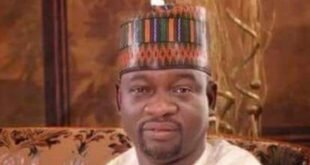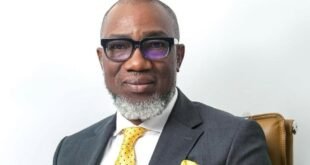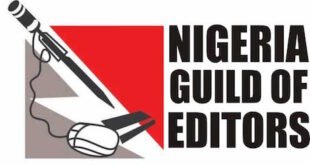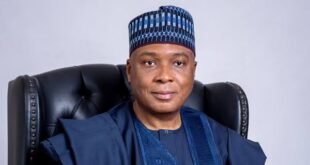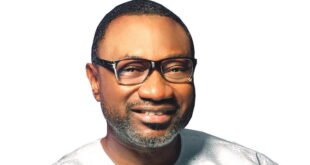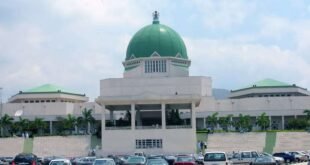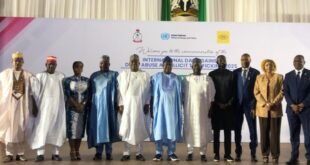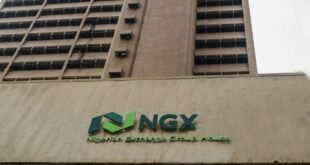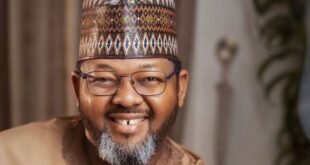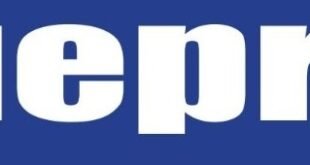Less than 10 days to go. That is if the planned protests against hunger, poverty, bad governance, and so on actually happen. The protests are scheduled for August 1-10. The organizers have a name for it: Days of Rage. The protests are designed to happen simultaneously across the country for 10 days straight. Unless Nigeria changes, this project and especially its duration looks like a tall order.
Nigeria in the 1960s, 1970s and 1980s seems like a long time ago. That period has almost been erased from our collective memory. During those times, Nigerian youth, led largely by university students, openly opposed government policies or programs that they considered were not in the best interests of the country. They did so in 1962, just two years after Nigeria gained independence from Britain. They fought to ensure the annulment of the clearly one-sided Anglo-Nigerian Defence Agreement.
Alex Lennox-Boyd was the British foreign secretary for the colonies in 1958, two years before Nigeria gained independence. In fact, by 1958 both the Eastern and Western territories had gained self-governing status from the colonial powers. The Northern territories, apparently fearing the dominance of the more developed Southern territories, said they were not ready for self-government and preferred to be under British sovereignty.
A 1958 memo by Lennox-Boyd outlined the elements of a British-Nigerian Defence Agreement that was to be submitted to the independent Nigerian government for signature. There is no evidence that Nigerian nationalists jockeying to replace the British had any input into the drafting of the so-called Agreement. History, however, records that Chief Obafemi Awolowo, leader of the Action Group (AG) political party rebelled against the pact to the best of his knowledge.
So, in 1962 when the British showed their support for the implementation of the pact by our country’s leaders, Nigerian students rose up as one to march on their campuses and on the streets of the country’s major cities in opposition to the Agreement. They did not give up until the British withdrew and Nigeria withdrew. At that time, there were not many universities or higher learning institutions. And the student leaders were not known to be partisan politicians of the then dominant political parties such as the National Council for Nigeria and Cameroons (NCNC) and the AG. Issues of ethnic or tribal affiliation were virtually non-existent.
The sticking points in the agreement were Nigeria’s granting of overflight rights to Britain and testing of Royal Air Force aircraft; and whether Britain should still have ground maintenance staff in Nigeria. Nigerian youths were emphatic in their no as they believed it was an unequal relationship and moreover there was no evidence that Nigeria had contributed to the drafting of the so-called Agreement.
As a result, the UK and Nigeria were forced to issue a statement terminating the pact. The statement read: “The UK and Nigerian governments have consulted together on the UK-Nigeria Defence Agreement. They have noted with concern that the scope and purpose of the Agreement have been widely misunderstood. In particular, concerns have been raised that as a result of the Agreement, Nigeria’s actions may be compromised and that it may even be involved in hostilities against its will.
The statement continued: “The text of the Agreement shows that these and other concerns that have been expressed are completely unfounded. Nevertheless, in order to end the misunderstanding, both governments consider it prudent to reconsider the need for a formal agreement.
“As a result, they decided to abrogate the Agreement. However, each government would endeavour to provide the other government with such assistance and facilities in defence as the Commonwealth partners might require.” That was Nigeria in the 1960s.
In the 1970s, more institutions of higher learning including universities sprang up. And the victory of the Anglo-Nigerian Defence Agreement had strengthened the resolve of the youth and students that opposing real or perceived government policies was right and could be won. And then came 1978. The regime of General Olusegun Obasanjo who replaced the assassinated General Murtala Muhammed increased the fees that students had to pay in universities. Hell broke loose. The students would not accept it and the military regime would not give in either. Colonel Ahmadu Ali was the federal commissioner (minister) of education. He had the support of the ruling junta hierarchy to hold on. And he did. The protesting students were no less determined. The result was bloodshed on the streets, deaths and injuries especially on the student side. The student uprising was aptly labelled the ‘Ali Must Go Protest’. Also known as the 1978 Student Crisis, it has been regarded as one of the most violent student agitations in the country. This action was also mentioned as the cause of the political crisis that hit the Muhammed/Obasanjo military regime in 1975-1979.
In addition to the cancellation of tuition fees, the protesting students and the boycott of classes demanded a return to democracy and civilian rule; democratization of government institutions; genuine independence of the country; and, an improvement in the quality of life of the people. Some commentators have argued that the bloody confrontation ended in a stalemate, but it is worth noting that the military regime stepped down only 17 months after the democratically elected administration of President Shehu Shagari and Vice President Alex Ekwueme.
“Ali Must Go” was a turning point in the relationship between Nigerians and their rulers. Successive rulers adopted a pattern that there would be no consequences for using violence and lethal force to quell any type of protest.
Fast forward to October 2020. For decades, Nigerians have been subjected to the brutality of state security agents, particularly a branch of the Nigeria Police Force (NPF) called SARS- Special Anti-Robbery Squad. SARS is notorious for its bloodshed, brutalizing the hapless Nigerian youth, acting with impunity and as if its operatives were above the law. Any young person they found with a laptop was automatically tagged as an Internet fraudster while those with braided hair (dreadlocks) were treated as vagrants and criminals. SARS dealt with the young people swiftly by blackmailing or executing them. Even the elders were not spared. Something had to be done. And it did so on October 8, 2020 when the youth took a stand by protesting and demonstrating against police violence and brutality. The protests turned into demands for good governance. On October 20, the “Ali Must Go” bloodbath of 1978 was repeated, but this time on a much larger and unimaginable scale. There was a massacre. The world was disgusted. The voices of condemnation filled the air. Nigeria has finally perfected the art of killing its children who protest brutality, corruption and bad governance. They are armed only with patriotic songs, waving the national flag and singing the national anthem.
First, the government led by Maj. Gen. Muhammadu Buhari, a military dictator masquerading as a civilian ruler, used thugs and street children to infiltrate previously peaceful protests, to incite violence, looting and destruction of public property. Then, under cover of darkness on October 20, the unconscionable regime ordered soldiers to shoot and kill our children in cold blood. The ghosts of the children who were slaughtered at one of the massacre sites – the Lekki toll gate, Lagos – that day still haunt the place and hunt for their killers. They can pretend, but they will not have peace. I believe the Bible says that there is no peace for the wicked and that those who kill by the sword will die by the sword. It is only a matter of time.
English: In the four years since the ENDSARS Protests in October 2020, there has been a vigorous campaign by a section of the Yoruba nation, a not insignificant number admittedly, to hold the Ndigbo accountable for inciting the protests and spearheading the looting and burning of public buildings in Lagos after the riots. As Nigeria moves almost inevitably towards a new round of confrontation that could result from the Days of Rage planned to begin August 1, the narrative of the Igbo being responsible for past protests has resurfaced and gained currency. And this false and malicious narrative always has consequences for the Ndigbo. The Igbo paid with livelihoods, limbs and lives in 1966 after the July counter-coup. July was the culmination of the persistent spread of lies and propaganda that the Igbo were the masterminds of the January 1966 military coup in which several political and religious leaders in the north were killed. It did not matter if it was a lie because the Igbo paid a very heavy price.
*Continued.
AUTHOR: UGO ONUOHA
Articles published on our Graffiti section are solely the opinions of the authors and do not represent the views of Ripples Nigeria or its editorial stance.
OPINION: Ndigbo in the crosshairs of ‘Days of Rage’ first appeared on Latest Nigeria News | Headlines from Ripples Nigeria.
 JamzNG Latest News, Gist, Entertainment in Nigeria
JamzNG Latest News, Gist, Entertainment in Nigeria
